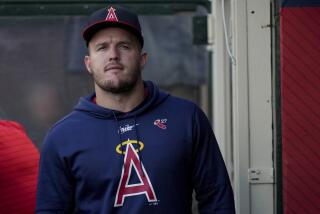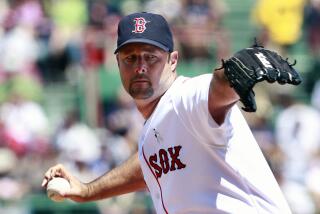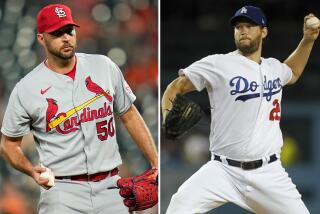HE’S MORE THAN Tough Enough : Winfield’s Ability to Roll With Punches Puts Him on the Brink of 3,000-Hit Plateau
- Share via
Coming up to 3,000 hits in September of his 21st big league season, Dave Winfield says a willingness to adapt and adjust have been keys to his continuing success.
“Players who don’t adjust are dinosaurs,” said Winfield, still a long way from Jurassic Park.
“There’s so much scouting now that pitchers change their approach from series to series, game to game. Kids who come to the majors thinking they can hit one way, as they always have, are in for a rude awakening.
“I’m probably in my fourth generation of hitting styles. I could look at a picture of myself in a nondescript uniform and know what year it was by the style I was using.”
Now called “Big Daddy” by the Minnesota Twins, Winfield, who will turn 42 on Oct. 3, has survived the scouting reports and more.
He learned to play in the major leagues, a pitcher-shortstop who survived the move to the outfield with the San Diego Padres, then went on to survive nine-plus years with George Steinbrenner in New York, a back injury that prevented him from playing in 1989 and the happy transitions from New York to Anaheim to Toronto to Minnesota.
Remarkably, he has never had what could be considered a bad statistical season. He has combined power and average as few have, and now he has come full circle, returning to his roots.
Winfield swung a bat for the first time on the sandlots of St. Paul. The former Twin shortstop, Zoilo Versalles, was his first hero. He was drafted while at the University of Minnesota by the Minnesota Vikings of the NFL, the Atlanta Hawks of the NBA, the Utah Stars of the ABA and the Padres of the National League.
He has played for 16 managers, won seven Gold Gloves, been an All-Star 12 times, and delivered the winning hit in Game 6 of the World Series. He became the first 40-year-old to drive in 100 or more runs last season, and needs only four hits to become the 19th player with 3,000, a ticket to Cooperstown.
Winfield said he doesn’t even think about the Hall of Fame, but added, “If you’re going to achieve something special, like 3,000 hits, what could be better than to do it in your hometown, where I started, where I first dreamed about playing in the big leagues?
“I mean, I’ve always tried to take a businesslike approach, and I’ve tried to treat this season no different than any other, but the 3,000 has been there from the start (he needed 134 hits when the season began), and I’ve had a lot of support--in and out of the clubhouse.
“If I had my choice, I would really like to do it with a double and be able to stand in the middle of the diamond and soak it all in, but I don’t know what my emotions will be like. You never know until it happens. I know I’ll have a big smile and be very happy and proud.
“Baseball is more than 100 years old and fewer than 20 guys have done it.”
A double would be appropriate. He is 25th on the all-time list. He is also ninth in at-bats, 12th in total bases, 10th in games, 13th in runs batted in, 15th in extra-base hits, 35th in walks and 19th in home runs with 451.
During the Twins’ disappointing season, Winfield has 20 home runs and 67 runs batted in, and his 20th home run put him in position to join Hank Aaron, Willie Mays, Stan Musial and Carl Yastrzemski as the only players with 452 or more among their 3,000 hits.
Babe Ruth, Jimmie Foxx, Lou Gehrig, Mel Ott, Frank Robinson and Reggie Jackson, among the players with that many homers, never got 3,000 hits. Ty Cobb, Al Kaline, Cap Anson, Eddie Collins and George Brett, among the players with 3,000 hits, never got that many homers.
“Dave has always considered himself a throwback,” said his attorney, Jeffrey Klein. “His mantra is that he has always wanted to be regarded as the complete player.
“Billy Martin once said that the one player he always hated to face as a member of an opposing club was Winfield, because he had so many ways to beat you.”
Though he no longer plays the outfield and thanks the designated-hitter rule for allowing him “to continue contributing at a high level,” Winfield is still capable of beating a team with a home run or infield hit, which was, in fact, his first hit. He tapped a slow roller to third against Jerry Reuss, then with the Houston Astros. He appeared in 156 games last season and will appear in about 140 this season.
“There have always been comments, particularly when I was in New York, that I was just a free swinger, an athletic kind of guy,” Winfield said. “I’ve always resented those comments because they came from people who didn’t know me well enough to know that I know the intricacies of hitting, that I know when to adjust and when not to.
“I mean, it’s one thing to have hit for power, but it’s been a challenge for a hitter of my size (6-feet-6 and 245 pounds) to hit for average and lead the league in RBIs, but I decided long ago that I wanted to be a combination of the three (hitting for average, power and run productivity), and if I was down in a certain area I’d make a conscious effort to bring it up.
“There were years in the early ‘80s when I felt I could have consistently led the league in home runs if I had wanted, but I was always concerned that other areas would suffer and I never cut loose. In ‘84, I pulled a muscle early and was so far behind other guys in home runs and RBIs by the time I came back that I made a conscious effort to think only in terms of hits and ended up at (a career-high) .340.
“I’ve tried to treat every year as a learning experience, to step back at times and think about how I could be more focused, but on an overall basis I’ve always been able to maintain some consistency, and I’m proud of that.”
Winfield began this season with an average of .285. He also had averaged 23 homers and 90 RBIs per season.
He would already be at 3,000 hits if he hadn’t sat out the 1989 season because of a herniated disk and subsequent surgery, but said: “The challenge of that rehabilitation in what was already a hostile environment (New York) may have given me the strength to keep going as long as I have. I get letters now from people over 40 saying, ‘You and Nolan Ryan are our heroes. It’s great to see you still vibrant and contributing.’ I’ve always thrived on challenges.”
It began in San Diego, without a day in the minors, when Winfield had to learn a new position.
Before, during and after, he received guidance and instruction in various areas from the likes of Charlie Lau, Bob Watson, Lou Piniella, Billy Williams, Steve Garvey, Pete Rose, Willie McCovey, sandlot instructors Bill Allen and Bill Peterson, and a Yankee video expert, Mike Barnett.
He learned there are five components necessary to play as long and successfully as he has: God-given ability; knowledge of techniques and fundamentals; diligent practice; physical conditioning, and mental toughness.
“I didn’t have them all working for me when I began, but I was fortunate to find them early in my career,” Winfield said. “A lot has gone into making me who I am.”
Including, of course, the Steinbrenner years, a part of his career that Winfield says still is not a “simple or cut and dried” thing for him to talk about. Recalling Steinbrenner’s “Mr. May” remark, when Winfield went one for 22 in the 1981 World Series, Steinbrenner’s refusing to make contracted payments to the Winfield Foundation, and his hiring of a known gambler, Howard Spira, to dig up dirt on Winfield, Winfield said:
“I survived something no athlete or no person should have been subjected to. I don’t think anybody else has reached these heights, having had to go through an environment in which he wasn’t wanted to succeed.
“It was reprehensible and immoral, and I’m the only one who knows how much better I could have been without the distractions.”
They, too, provided Winfield with new resolve, and in the wake of what he called the “New York grind,” he was “reinvigorated” by two years with the Angels.
“It was a chance to play every day, to play the outfield again, to have a team believe in you, and to be able to participate in civil, open discussions with the owner and his wife,” Winfield said of Gene and Jackie Autry.
“The last few years, I’ve enjoyed the game a lot more because there’s been a real cooperative effort coming from the teams I’ve been with.
“I wouldn’t have experienced that if I hadn’t survived New York. I’d have never won a championship. I’d have never had the chance at 3,000 hits or to be able to enjoy my career as I now do.”
Winfield said he isn’t sure if the Angels no longer thought he could do the job or wanted to go with youth, but that he had no hard feelings about their decision not to pick up his 1992 option.
Likewise, he said, he wasn’t shocked when the Blue Jays offered him only a one-year contract despite his 108 RBIs last year, his vital role in energizing the players and community, and his decisive double against Charlie Leibrandt in Game 7 of the World Series against Atlanta.
“I thought I deserved more than a one-year contract, but I’ve been schooled enough in business to know what can happen,” Winfield said.
“I was disappointed that I didn’t get to revel in the year after with my teammates, but I’ve since had some opportunities with them to share the memories I’ll never forget. There was such an outpouring of emotion for me that it wasn’t like a one-year stand. It was like I had been there forever.”
He returned to Minnesota with a two-year contract. He returned to the city in which his late mother, Arline, a single parent, had worked 31 years as an audio-visual aide with the board of education, her sons learning the value of self-esteem, dealing fairly with others and giving an employer his money’s worth, Winfield said.
He returned to the city in which he once wavered among baseball, football and basketball.
“The way I finally looked at it was, I could either be a big man in baseball, an average-sized man in basketball or a broken man in football,” Winfield said.
“I’m happy for guys like Bo (Jackson) and Deion (Sanders). They seem to have gotten what they wanted combining two (football and baseball), but neither will be half the baseball player I was because they didn’t do it full-time. If I had tried basketball or football, I’d probably be retired now, or injured (as Jackson was).”
Instead, he continues to expand his horizons on and off the field.
He owns 17 fast-food restaurants. He is an adviser to President Clinton on summer jobs for young people. His Winfield Foundation, having weathered questions of financial impropriety at times, remains nationally recognized for its work in the area of substance-abuse education.
He has homes in New Jersey, Florida and California. He has become closer to his long-estranged father. He has been close to and supportive of a 6-year-old daughter born to a Texas woman with whom he once had a relationship. She filed a common-law marriage suit against Winfield and won a $1.6-million jury judgment. That later was set aside because of the judge’s error in his instructions to the jury and the woman has yet to refile.
He and his longtime friend, Tonya, have been married since 1988, the marriage having survived the suit by the mother of his daughter and another by Mike Tyson’s former mother-in-law, Ruth Roper. She and Winfield had dated and she claimed that he had given her a venereal disease. Winfield denied it and the suit was eventually settled out of court.
The tabloids had a field day with the lawsuits and the Steinbrenner feud, but it all seemed to dissipate when he left New York.
Now, Winfield continues to have his days on the field in an era when financial security comes early, knowing that probably not many others will stick with the game for 21 years to try for 3,000 hits.
“There may not be that many,” Winfield said. “Take Ken Griffey (Jr.). He’s 23 and making $6 million a year. The only way he’ll play this long is if, 10 years from now, he walks in, puts a hand on the owner’s shoulder and says, ‘OK, I love the game, I’ll play for $2 million a year.’
“I mean, what would his salary be otherwise? They couldn’t afford him and he wouldn’t need it. In my case, I didn’t plan to play this long, but I’ve looked for ways to keep it going because I enjoy it, I take pride in it. I also haven’t priced myself out of the market. I never dreamed I’d play for five teams, that’s just the way it’s happened.
“And,” he added with a smile, “I can’t say five will be the end of it, either.”
Rating Winfield
A look at how Dave Winfield compares with members of the 3,000-hit club, using seasonal averages in the major offensive categories. Hits are current; averages are entering this season:
Player Years Hits Avg. HR RBI Pete Rose 24 4,256 .303 7 55 Ty Cobb 24 4,191 .367 5 82 Hank Aaron 23 3,771 .305 32 101 Stan Musial 22 3,630 .331 22 89 Tris Speaker 22 3,515 .344 5 71 Honus Wagner 21 3,430 .329 5 82 Carl Yastrzemski 23 3,419 .285 20 80 Eddie Collins 25 3,309 .333 2 52 Willie Mays 22 3,283 .302 30 87 Nap Lajoie 21 3,252 .339 4 76 Paul Waner 20 3,152 .333 6 65 George Brett* 20 3,131 .307 15 76 Robin Yount* 19 3,125 .287 13 71 Cap Anson 22 3,081 .334 4 78 Rod Carew 19 3,053 .328 5 53 Lou Brock 19 3,023 .293 8 47 Al Kaline 22 3,007 .297 18 72 Roberto Clemente 18 3,000 .317 13 73 Dave Winfield* 19 2,996 .285 23 90
* Active
More to Read
Go beyond the scoreboard
Get the latest on L.A.'s teams in the daily Sports Report newsletter.
You may occasionally receive promotional content from the Los Angeles Times.










